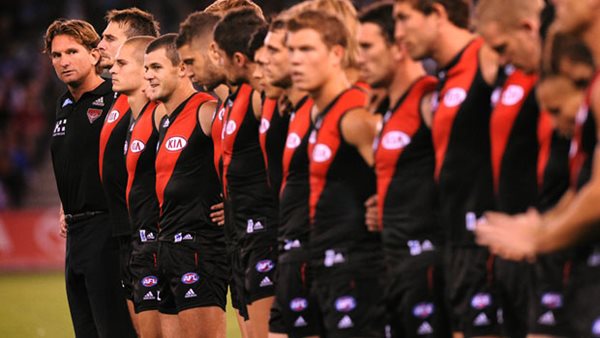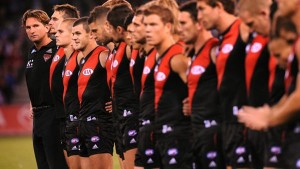With the dethroning of umpteenth prime ministers in the space of just a few years, the much talked about twenty-four-hour media cycle and the apparent loss of advantage that incumbency once used to guarantee, it’s become common to hear pundits declare that nothing is predictable in Australian politics anymore. Such end-of-history posturing has a tone of fatalism that I often think reflects the media’s diminishing influence as the only vector through which politicians can speak to voters. Nonetheless, something very odd happened the other week that gave one pause for thought – perhaps they’re on to something.
The most nationalist and jingoistic segments of the commentariat, who usually swoon over military men in starched uniforms, polished boots and a chest full of medals, were indignant when former army chief, David Morrison, was awarded the country’s highest gong.
It was at once both surreal and beautiful to watch – torn between their love of the martial spirit and their disdain for left-wing latte-sipping Ray-Ban-wearing liberals, the right was forced to make a choice. And they chose to go after the guy in uniform. After all, one can’t stand by while the nation is being taken over by PC loving ‘feminazis’ and ‘leftards’.
But the real show was going on just stage right. It, too, shone a light on the absurdity of the Australia Day Awards and was entwined with that bizarre construct that is our national identity.
Whilst the front pages were filled with invectives about how the Australian of the Year Awards had fallen prey to the ills of identity politics and PC culture, the back pages were wrestling with a far more existential threat: what if Australian sportsmen were a bunch of drug cheats?
Sport has been at the centre of Australia’s national identity since the early days of white occupation. It was central to Donald Horne’s thesis in The Lucky Country (a book, incidentally, too often cited uncritically – as if Horne had it divinely dictated to him. Nonetheless, here goes.):
A nation more concerned with styles of life than with achievement has managed to achieve what may be the most evenly prosperous society in the world. It has done this in a social climate largely inimical to originality and the desire for excellence (except in sport) and in which there is less and less acclamation of hard work.
That ‘except in sport’ is more than just an aside. Horne elevated sport to a unique position within the Australian consciousness – it is the exception to his rule.
This is evident in the high frequency with which winners of the Australian of the Year Award have been selected from the sporting category – far higher than from any other category. The organisers themselves describe this – almost apologetically – as the awards ‘most striking trend’.
There are, of course, important historical and cultural reasons for this. It was on the sporting field that Australia first had the opportunity to push back against the colonial stereotype of a penal backwater, populated by drunkards and petty thieves.
The biggest coup came in 1882 when the Australian cricket team defeated England for the first time. The Ashes were born and it remains a significant touchstone in Australian culture.
More generally, the sporting field is, today, one of the few places Australia is confident in projecting itself internationally. And to do so assumes a certain level of competence over an extended period, based on hard work and honed skills – not smarter cheating.
This has made for some interesting analysis of the Essendon doping saga. Australian sporting teams have long prided themselves on, as the ol’ adage goes, ‘playing hard but fair’. Well, now that that doesn’t appear to be so – and in Australian Rules, of all sports. Punters and commentators alike are groping for explanations that don’t undermine both the integrity of the game and their sense of Australianness.
The most common of these has been what I’ve come to call the ‘gone rogue’ theory, in which all the blame is heaped on a couple of fall guys; namely, Stephen Dank, the Essendon sports scientist who oversaw the regime.
But, as Stephanie Convery pointed out in Overland, the institutional, cultural and material pressures on players to not just take part in the program, but to remain silent about it, were considerable. The conditions that led to Essendon’s doping regime have been developing over many years and continue to exist. It is, in many ways, a by-product of the ‘win at all costs’ attitude – coupled with sizeable financial incentives – that have become an intrinsic element of professional sport.
These conditions are hardly new, nor are they unique to Australia or, indeed, Aussie Rules. Thus, doping in other sports by other countries is fairly common. And there’s usually a long line of Australians quick to call these ‘cheats!’ out on their indiscretion. But when it’s Australian sportsmen, in the quintessentially Australian game, there seems to be a bit of a blind spot in the national consciousness.
The Essendon saga shatters the myth that organised cheating and doping is the realm of other nations. (A practice, so the narrative goes, that has probably cost Australia countless medals over the journey.) Yet, despite the international Court of Arbitration for Sport’s (CAS) ruling, some are still claiming Australian exceptionalism. And it’s sprouting some highly irrational commentary. Enter Herald Sun chief football writer, Mark Robinson, who believes Jobe Watson should be able to keep his Brownlow Medal despite being found guilty of doping. In fact, his argument is so absurd it’s difficult to know exactly how to attack it without sounding patronising. Needless to say, while much of this saga has been opaque, this point couldn’t be clearer – there is no decision to be made. Whether they want to or not, the AFL has no choice but to take the Brownlow off Watson – he was found to have cheated. Case closed. Perhaps it’s time to touch up on your afl grand final betting strategies in case this might affect your wins! No one wants a cheater in their sport.
‘Robbo’, like many others who are genuinely riven by these revelations, continue to push the ‘gone rogue’ theory as some kind of subconscious damage control mechanism. They’re not just trying to save the reputation of the game they love, they’re also scrambling to preserve a much more fundamental idea of what it means to be Australian.
(This was originally published in Overland on 10th February, 2016.)


